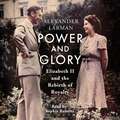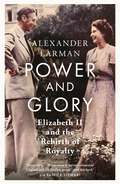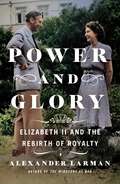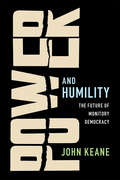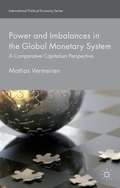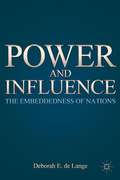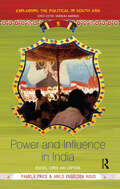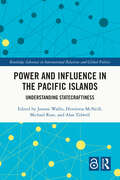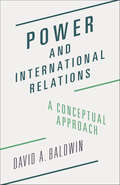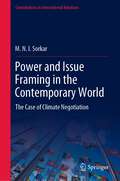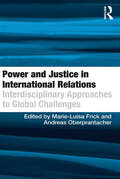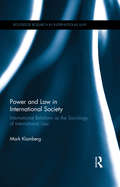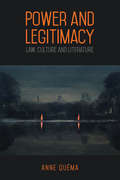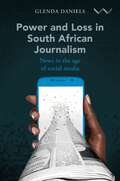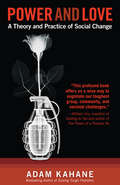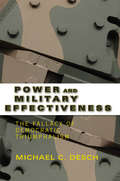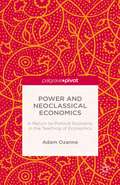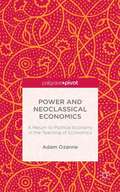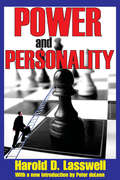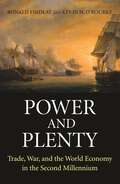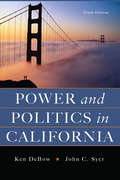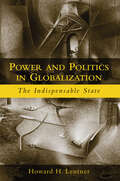- Table View
- List View
Power and Education: Contexts of Oppression and Opportunity
by Antonia KupferEducation is a crucial influence early in life and is therefore inextricably linked with power. This book examines how education can limit opportunities and create social inequality as well as being an empowering force for good. Theoretical approaches on the relationship of power and education are discussed as are questions on power and knowledge.
Power and Global Economic Institutions
by Ayse KayaWhat is the relationship between states' economic power and their formal political power in multilateral economic institutions? Why do we see variation in states' formal political power across economic institutions of the same era? In this book, Ayse Kaya examines these crucial under-explored questions, drawing on multiple theoretical traditions within international relations to advance a new approach of 'adjusted power'. She explains how the economic shifts of our time, marked by the rise of Brazil, Russia, India, China and other emerging economies, have affected and will impact key multilateral economic institutions. Through detailed contemporary and historical analyses of the International Monetary Fund, the World Bank, the G20, and the International Trade Organization, Kaya shows that the institutional setting mediates the significance of the underlying distribution of economic power across states. The book presents both case studies and key statistics.
Power and Glory: Elizabeth II and the Rebirth of Royalty
by Alexander LarmanPower and Glory brings us to the dramatic conclusion of Larman's 'Windsors trilogy'.It begins with the fallout from the revelation of the Duke of Windsor's wartime treachery, and ends with the Coronation of Elizabeth II on 2 June 1953. In between, it depicts a monarchy - and a country - struggling to cope with the aftermath of World War Two, in an era where old certainties have been replaced by the rise of a new, uncertain world, and where love, tragedy and modernity battle for supremacy.The book draws on extensive unpublished correspondence between major members of the Royal Family including George VI, Princess Elizabeth and the Duke of Windsor, the Prime Ministers Clement Attlee and Winston Churchill, and previously unseen diaries and memoranda from courtiers, personal secretaries and leading politicians, exploring everything from the King's declining health to the (often negative) reactions to Elizabeth's marriage to Prince Philip and Coronation.Power and Glory features the same intricately researched and incisively written account of Britain's most famous family as Larman's previous books, but on an epic international scale. It covers everything from the end of British rule in India to the foundation of the United Nations, and the crucial role that monarchy played in the ever-shifting era - as well, naturally, as the way in which the Duke and Duchess of Windsor attempted to return to relevance, whatever the cost might be to the wider Royal Family.
Power and Glory: Elizabeth II and the Rebirth of Royalty
by Alexander LarmanPower and Glory brings us to the dramatic conclusion of Larman's 'Windsors trilogy'.It begins with the fallout from the revelation of the Duke of Windsor's wartime treachery, and ends with the Coronation of Elizabeth II on 2 June 1953. In between, it depicts a monarchy - and a country - struggling to cope with the aftermath of World War Two, in an era where old certainties have been replaced by the rise of a new, uncertain world, and where love, tragedy and modernity battle for supremacy.The book draws on extensive unpublished correspondence between major members of the Royal Family including George VI, Princess Elizabeth and the Duke of Windsor, the Prime Ministers Clement Attlee and Winston Churchill, and previously unseen diaries and memoranda from courtiers, personal secretaries and leading politicians, exploring everything from the King's declining health to the (often negative) reactions to Elizabeth's marriage to Prince Philip and Coronation.Power and Glory features the same intricately researched and incisively written account of Britain's most famous family as Larman's previous books, but on an epic international scale. It covers everything from the end of British rule in India to the foundation of the United Nations, and the crucial role that monarchy played in the ever-shifting era - as well, naturally, as the way in which the Duke and Duchess of Windsor attempted to return to relevance, whatever the cost might be to the wider Royal Family.
Power and Glory: Elizabeth II and the Rebirth of Royalty
by Alexander LarmanAlexander Larman, the master chronicler of the House of Windsor, brings his acclaimed trilogy to a dramatic and poignant conclusion.When the Royal Family took to the balcony of Buckingham Palace on VE Day in 1945, they knew that the happiness and excitement of the day was illusory. Britain may have been victorious in a painful war, but the peace would be no easier. Between the abdication crisis, the death of King George VI, and the ascension of young Elizabeth II to the throne, the continued existence of the monarchy seemed uncertain. And the presence of the former Edward VIII, now the Duke of Windsor, conniving and sniping from the sidelines in an attempt to regain relevance, even down to writing a controversial and revelatory memoir, could only make matters worse. Still, the question of whether or not Elizabeth could succeed and make the monarchy something that once again inspired international pride and even love remained.In Power and Glory, Alexander Larman completes his acclaimed Windsor family trilogy, using rare and previously unseen documents to illuminate their unique family dynamic. Through his chronicling of events like the Royal Wedding, George VI’s death and the discovery of the Duke of Windsor’s treacherous activities in WWII, Larman paints a vivid portrait of the end of one sovereign’s reign and the beginning of another’s that heralded a new Elizabethan Age which would bring power and glory back to a monarchy desperately in need of it.
Power and Governance in a Partially Globalized World
by Robert KeohaneAs one of the most innovative and influential thinkers in international relations for more than three decades, Robert O. Keohane's groundbreaking work in institutional theory has redefined our understanding of international political economy. Consisting of a selection of his most recent essays, this absorbing book address such core issues as interdependence, institutions, the development of international law, globalization and global governance. The essays are placed in historical and intellectual context by a substantial new introduction outlining the developments in Keohane's thought, and in an original afterword, the author offers a challenging interpretation of the September 11th attacks and their aftermath. Undoubtedly, this book is essential reading for anyone with an interest in international relations.
Power and Humility: The Future of Monitory Democracy
by John KeaneDemocracy urgently needs re-imagining if it is to address the dangers and opportunities posed by current global realities, argues leading political thinker John Keane. He offers an imaginative, radically new interpretation of the twenty-first-century fate of democracy. The book shows why the current literature on democracy is failing to make sense of many intellectual puzzles and new political trends. It probes a wide range of themes, from the growth of cross-border institutions and capitalist market failures to the greening of democracy, the dignity of children and the anti-democratic effects of everyday fear, violence and bigotry. Keane develops the idea of 'monitory democracy' to show why periodic free and fair elections are losing their democratic centrality; and why the ongoing struggles by citizens and their representatives, in a multiplicity of global settings, to humble the high and mighty and deal with the dangers of arbitrary power, force us to rethink what we mean by democracy and why it remains a universal ideal.
Power and Imbalances in the Global Monetary System
by Mattias VermeirenThe author examines the indirect macroeconomic roots of the global financial crisis and Eurozone debt crisis: the escalation of global trade imbalances between the US and China and regional trade imbalances in the Eurozone. He provides new insights into the sources and dynamics of power and instability in the contemporary global monetary system
Power and Influence
by Deborah E. De LangeThis book investigates whether and why social structure influences cooperative organizational strategic decision making in an international relations context. It looks in particular at the United Nations General Assembly (UNGA).
Power and Influence in India: Bosses, Lords and Captains (Exploring the Political in South Asia)
by Pamela Price Arild Engelsen RuudTaking cognisance of the lack of studies on leadership in modern India, this book explores how leadership is practiced in the Indian context, examining this across varied domains — from rural settings and urban neighbourhoods to political parties and state governments. The importance of individual leaders in the projection of politics in South Asia is evident from how political parties, mobilisation of movements and the media all focus on carefully constructed personalities. Besides, the politically ambitious have considerable room for manoeuvre in the institutional setup of the Indian subcontinent. This book focuses on actors making their political career and/or aspiring for leadership roles, even as it also foregrounds the range of choices open to them in particular contexts. The articles in this volume explore the variety of strategies used by politically engaged actors in trying to acquire (or keep) power — symbolic action, rhetorical usage, moral conviction, building of alliances — illustrating, in the process, both the opportunities and constraints experienced by them. In taking a qualitative approach and tracking both political styles and transactions, this book provides insights into the nature of democracy and the functioning of electoral politics in the subcontinent.
Power and Influence in the Pacific Islands: Understanding Statecraftiness (Routledge Advances in International Relations and Global Politics)
by Michael Rose Joanne Wallis Henrietta McNeill Alan TidwellThis book outlines an analytical framework to understand power, influence, and statecraft in the Pacific Islands region. With contributions by scholars from the United States, Australia, China, New Zealand, and across the Pacific Islands region, it provides ‘both sides of the story’ of statecraft and explores how power and influence are being exercised in the Pacific Islands. Amid escalating strategic competition, the United States, China, Australia, and a range of other partners are trying to exercise power and influence in their Pacific Islands region through their statecraft. But which partners are doing what, where are they doing it, and how are Pacific Island countries and people responding? Through case studies of key examples – such as economic assistance, defence diplomacy, scholarships, and strategic narratives – this book analyses how tools of statecraft are being deployed by a range of key partners and Pacific Island states, and how they are being received by Pacific Island countries and people.A vital resource for scholars and practitioners in International Relations and diplomacy as well as those seeking to understand how statecraft, power, and influence are being exercised in the Pacific Islands region.The Open Access version of this book, available at http://www.taylorfrancis.com, has been made available under a Creative Commons [Attribution-Non Commercial-No Derivatives (CC-BY-NC-ND)] 4.0 license.
Power and International Relations: A Conceptual Approach
by David A. BaldwinContrary to conventional wisdom, the concept of power has not always been central to international relations theory. During the 1920s and 30s, power was often ignored or vilified by international relations scholars—especially in America. Power and International Relations explores how this changed in later decades by tracing how power emerged as an important social science concept in American scholarship after World War I. Combining intellectual history and conceptual analysis, David Baldwin examines power's increased presence in the study of international relations and looks at how the three dominant approaches of realism, neoliberalism, and constructivism treat power.The clarity and precision of thinking about power increased greatly during the last half of the twentieth century, due to efforts by political scientists, psychologists, sociologists, economists, philosophers, mathematicians, and geographers who contributed to "social power literature." Baldwin brings the insights of this literature to bear on the three principal theoretical traditions in international relations theory. He discusses controversial issues in power analysis, and shows the relevance of older works frequently underappreciated today.Focusing on the social power perspective in international relations, this book sheds light on how power has been considered during the last half century and how it should be approached in future research.
Power and Issue Framing in the Contemporary World: The Case of Climate Negotiation (Contributions to International Relations)
by M. N. SorkarThis book puts forward a new angle of understanding the society of states in the milieu of the contemporary world. The absence of a regulatory mechanism, i.e., anarchy, has been the fundamental issue of international relations. This book explains how the normative imperatives, information and communication technology (ICT) and nuclear deterrence generated ambiance have poised the states in a society where they are bound to follow certain normative imperatives that dilute the color and meaning of anarchy and obliges the states to act in a certain way. It develops a theoretical proposition with regard to state power defined in terms of the capability of determining the outcomes. The proposition first elaborates how international institutions foster normative imperatives; then, in line with this ontology, it narrows down the focus solely on the power of the states in the contemporary world. It explains how the power that can determine the outcome today is holistic in nature, comprising both materialistic and normative factors. In the next step, it tailors the proposition in a way so as to employ it for a specific empirical work. The book does not end just positing the theoretical proposition; the proposition is testified through some case studies with regard to climate negotiations under the UNFCCC. The empirical part not only serves to examine the plausibility of the theoretical proposition, but it also presents the logic of the major actors and the politics with respect to some of the major issues of climate change, i.e., mitigation, funding policy and mechanism and adaptation. The scholars in this arena, climate activists and climate-conscious people in general would find this book worth reading as it kindles a different angle to understand the issues in the context of the contemporary world and as it elaborates the logic, framing process, and mechanism of reaching outcomes through complex negotiation process. No other work has so far analyzed the issues covering the entire period of 21 apex UNFCCC negotiations that led to the Paris Agreement. Apart from university libraries, this book, thus, has the prospect to be sold in the markets targeting the academicians, climate change experts, bureaucrats, negotiators and the common readers.
Power and Justice in International Relations: Interdisciplinary Approaches to Global Challenges
by Andreas OberprantacherOutstanding and thought-provoking, this book provides up-to-date and in-depth analyses of current developments in international politics. It highlights the (unilateral) use of force in international relations and its implication for international law, the chances and risks of international criminal justice, and the question of epistemic violence with regard to dominant discourses in the theory of international relations, such as nation-building and intercultural dialogue. Furthermore, the book focuses on conditions for global social and ecological justice in international economics against the background of financial crisis. It contributes in particular to a better understanding of the relation between power and justice in view of current global tensions while reflecting the work of the internationally acclaimed philosopher Hans Köchler.
Power and Law in International Society: International Relations as the Sociology of International Law (Routledge Research in International Law)
by Mark KlambergWhen studying international law there is often a risk of focusing entirely on the content of international rules (i.e. regimes), and ignoring why these regimes exist and to what extent the rules affect state behavior. Similarly, international relations studies can focus so much on theories based on the distribution of power among states that it overlooks the existence and relevance of the rules of international law. Both approaches hold their dangers. The overlooking of international relations risk assuming that states actually follow international law, and discounting the specific rules of international law makes it difficult for readers to understand the impact of the rules in more than a superficial manner. This book unifies international law and international relations by exploring how international law and its institutions may be relevant and influence the course of international relations in international trade, protection of the environment, human rights, international criminal justice and the use of force. As a study on the intersection of power and law, this book will be of great interest and use to scholars and students of international law, international relations, political science, international trade, and conflict resolution.
Power and Legitimacy
by Anne QuémaAn interdisciplinary analysis of the ways in which symbolic acts create social norms, Power and Legitimacy is an important contribution to the growing body of scholarship on law and literature. Drawing on the theoretical insights of Judith Butler and Pierre Bourdieu, Anne Quéma demonstrates the effect of symbolic violence on the creation of social and political legitimacy.Examining modern jurisprudence theory, statutory law, and the family within the modern Gothic novel, Quéma shows how the forms and effects of political power transform as one shifts from discourse to discourse. An impressive integration of the scholarship in these three fields, Power and Legitimacy is a thought-provoking analysis of the basis of power and the law.
Power and Loss in South African Journalism: News in the age of social media
by Dr. Glenda DanielsThis timely collection of essays analyses the crisis of journalism in contemporary South Africa at a period when the media and their role are frequently at the centre of public debate. The transition to digital news has been messy, random and unpredictable. The spread of news via social media platforms has given rise to political propaganda, fake news and a flattening of news to banality and gossip. Media companies, however, continue to shrink newsrooms, ousting experienced journalists in favour of 'content producers'.Against this backdrop, Daniels points out the contribution of investigative journalists to exposing corruption and sees new opportunities emerging to forge a model for the future of non-profit, public-funded journalism. Engaging and dynamic, the book argues for the power of public interest journalism, including investigative journalism, and a diversity of voices and positions to be reflected in the news. It addresses the gains and losses from decolonial and feminist perspectives and advocates for a radical shift in the way power is constituted by the media in the South African postcolony.A valuable introduction to the confusion that confronts journalism students, it has much to offer practising media professionals. Daniels uses her years of experience as a newspaper journalist to write with authority and illuminate complex issues about newsroom politics. Interviews with alienated media professionals and a semi-autobiographical lens add a personal element that will appeal to readers interested in the inner life of the media.
Power and Love: A Theory and Practice of Social Change
by Adam KahaneA new approach, proven in the field, for making progress on our most important and difficult collective challenges Based on Kahane’s first-hand experiences working with teams of business, government and civil society leaders around the world Profound, personal and practical The two main ways that people try to solve their toughest group, community and societal problems are fundamentally flawed. They either push for what they want at all costs—in it’s most extreme form this means war—or try to completely avoid conflict, sweeping problems under the rug in the name of a superficial ”peace.” But there is a better way: combining these two seemingly contradictory approaches. Adam Kahane argues that each is a reflection of two distinct, fundamental drives: power, the single-minded desire to achieve one’s solitary purpose; and love, the drive towards unity. They are inextricable parts of human nature, so to achieve lasting change you have to able to work fluidly with both. In fact, each needs the other. As Martin Luther King put it, “Power without love is reckless and abusive, and love without power is sentimental and anemic.” Kahane delves deeply in the dual nature of power and love, exploring their complex and intricate interplay. With disarming honesty he relates how, through trial and error, he learned to balance between them, shifting from one to the other as though learning to walk—at first falling, then stumbling forward, and finally moving purposefully toward true, lasting reconciliation and progress. For the last twenty years Kahane has worked around the world on a variety of challenges: economic development, food security, health care, judicial reform, peace making, climate change. He has worked with diverse teams of leaders—executives and politicians, generals and guerillas, civil servants and trade unionists, community activists and United Nations officials, clergy and artists. He has seen, up close and personal, examples of inspiring progress and terrifying regress. Power and Love reports what he has learned from these hard-won experiences.
Power and Military Effectiveness: The Fallacy of Democratic Triumphalism
by Michael C. DeschSince 1815 democratic states have emerged victorious from most wars, leading many scholars to conclude that democracies are better equipped to triumph in armed conflict with autocratic and other non-representative governments.Political scientist Michael C. Desch argues that the evidence and logic of that supposition, which he terms "democratic triumphalism," are as flawed as the arguments for the long-held and opposite belief that democracies are inherently disadvantaged in international relations. Through comprehensive statistical analysis, a thorough review of two millennia of international relations thought, and in-depth case studies of modern-era military conflicts, Desch finds that the problems that persist in prosecuting wars—from building up and maintaining public support to holding the military and foreign policy elites in check—remain constant regardless of any given state’s form of government. In assessing the record, he finds that military effectiveness is almost wholly reliant on the material assets that a state possesses and is able to mobilize. Power and Military Effectiveness is an instructive reassessment of the increasingly popular belief that military success is one of democracy’s many virtues. International relations scholars, policy makers, and military minds will be well served by its lessons.
Power and Neoclassical Economics: A Return to Political Economy in the Teaching of Economics
by A. OzanneMainstream economics almost completely ignores the role power plays in determining economic outcomes, which means it can only provide partial explanations of the distribution of wealth and income, and of the problems associated with inequality and poverty. For many, this is a fundamental failing that severely limits its relevance to the real world and is the source of much dissatisfaction with, and cynicism about, economics and economists. Ozanne explains how this neglect of power has come about over the past 150 years and why it is important. He reviews various definitions and theories of power from across the social sciences and proposes a new approach that could bring considerations of power back into standard economic theory and economics teaching. The approach is simple and intuitive, involving little more than re-envisioning the social welfare function as a 'political economy function'. However, if adopted in economics teaching, it could radically change the way young economists are taught to think about economic problems and lead to a 'return to political economy'.
Power and Neoclassical Economics: A Return to Political Economy in the Teaching of Economics
by Adam OzannePower and Neoclassical Economics.
Power and Personality
by Harold D. LasswellThis book concerns the wanting, getting, and giving of power. Recent advances in medicine, sociology, and psychology have deepened our understanding of the motives, skills, and experience that operate between leaders and those who are led. Since power is about decision-making, it figures not only in offi cial institutions but in other organizations, including political parties, pressure groups, trade associations, business enterprises, trade unions, and many other types of organizations.A general theory of the political personality is set forth here. Lasswell describes the process by which power becomes a value of first importance and the way appropriate skills in exercising power are acquired. He shows that special political types such as agitators or administrators are related to basic types of character that contribute to how they lead. Finally, his analysis offers original perspectives to understand democratic leadership.Lasswell offers definite suggestions for perfecting self-observatories in national and world affairs and for forming democratic personalities, selecting and training democratic leaders, and reducing destructive conflicts in human relationships. Power and Personality followed the author's 1930 work Psychopathology and Politics, which was widely hailed for its pioneering approach. Power and Personality reevaluated the entire issue of the relationship between psychology and politics in the light of subsequent experience and scientific developments since publication of that earlier work. Lasswell's ideas continue to carry great weight and persuasiveness.
Power and Plenty: Trade, War, and the World Economy in the Second Millennium (The Princeton Economic History of the Western World #30)
by Ronald Findlay Kevin H. O'RourkeInternational trade has shaped the modern world, yet until now no single book has been available for both economists and general readers that traces the history of the international economy from its earliest beginnings to the present day. Power and Plenty fills this gap, providing the first full account of world trade and development over the course of the last millennium. Ronald Findlay and Kevin O'Rourke examine the successive waves of globalization and "deglobalization" that have occurred during the past thousand years, looking closely at the technological and political causes behind these long-term trends. They show how the expansion and contraction of the world economy has been directly tied to the two-way interplay of trade and geopolitics, and how war and peace have been critical determinants of international trade over the very long run. The story they tell is sweeping in scope, one that links the emergence of the Western economies with economic and political developments throughout Eurasia centuries ago. Drawing extensively upon empirical evidence and informing their systematic analysis with insights from contemporary economic theory, Findlay and O'Rourke demonstrate the close interrelationships of trade and warfare, the mutual interdependence of the world's different regions, and the crucial role these factors have played in explaining modern economic growth. Power and Plenty is a must-read for anyone seeking to understand the origins of today's international economy, the forces that continue to shape it, and the economic and political challenges confronting policymakers in the twenty-first century.
Power and Politics in California
by Ken Debow John C SyerNow in its ninth edition,Power and Politics in California continues its tradition of asking Californians to take a hard and systematic look at their state governance, and engage themselves in a critical analysis of what is working, what is not, and what changes need to be made for the state to meet the increasingly formidable challenges it faces.The era of Arnold is now in its mid-stages, and the rise of this very different political personality has had significant impacts on the state. This ninth edition provides analysis of Governor Schwarzenegger in context and looks forward to how California's fiscal condition, educational system, and response to diversity will play a vital role in shaping the state's politics in the future.
Power and Politics in Globalization: The Indispensable State
by Howard H. LentnerFirst published in 2004. Routledge is an imprint of Taylor & Francis, an informa company.


